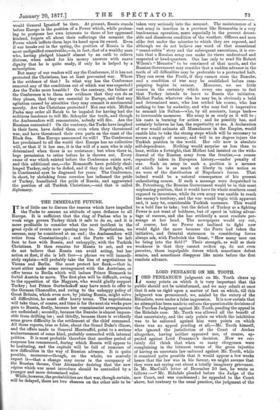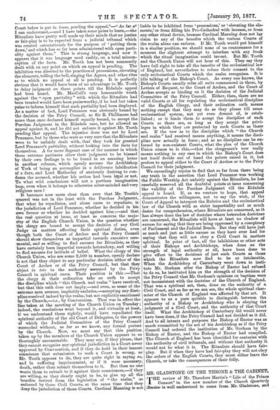LORD PENZANCE ON MB. TOOTH.
LORD PENZANCE'S judgment on Mr. Tooth clears up many points on which it is very important that the public should not be misinformed, and we may admit at once that it sets us right upon a matter of fact on which, till this judgment was pronounced, we, misled by the outcry of the Ritualists, were under a false impression. It is now certain that no attempthas been made to enforce the questionable decisions of the Purchas Judgment against Mr. Tooth, pending the appeal in the Ridsdale case. Mr. Tooth was allowed all the benefit of that uncertainty, and the only points on which the inhibition was to be enforced against him were points on which there was no appeal pending at all,—Mr. Tooth himself, who ignored the jurisdiction of the Court of Arches altogether, having neither appeared nor, of course, ap- pealed against Lord Penzance's decision. Now we cer- tainly did think that when so many clergymen were complaining in the bitterest terms of the gross injustice of having an uncertain law enforced against Mr. Tooth, while it remained quite possible that it would appear a few weeks hence that the law was in his favour, we might assume that they were not crying out about a totally imaginary grievance. In Mr. MacColl's letter of December 30 last, he wrote as follows :—" Mr. Ridsdale pleaded before the Judge of the new Court, and was condemned ; he appealed to the Court above, but contrary to the usual practice, the judgment of the Court below is put in force, pending the appeal,"—" As far as I can understand,—and I have taken some pains to learn,—the
Ritualists have pretty well made up their minds that no jastice or fair-play is to be expected from a judicial tribunal which was created ostentatiously for the purpose of putting them down,' and which has so far been administered with open parti- ality against them." This is strong language, and now it appears that it was language used rashly, on a total miscon- ception of the facts. Mr. Tooth has not been summarily dealt with on any point on which an appeal is pending. The inhibition was directed to the practices of processions, elevating the elements, tolling the bell, singing the Agnus, and other rites as to which no appeal at all is pending. It is perfectly obvious that it would have been of no advantage to Mr. Tooth to delay judgment on these points till the Ridsdale appeal had been heard. Mr. MacColl's very honourable wrath against the "open partiality" with which the Ritualists had been treated would have been praiseworthy, if he had but taken painsto inform himself that such partiality had been displayed. As a matter of fact, Lord Penzance was obviously bound by the decision of the Privy Council, as Sir R. Phillimore had more than once declared himself equally bound, to accept the Purchas Judgment in the Ridsdale case, but he allowed an appeal against it, and he did not enforce it against Mr. Tooth pending that appeal. The injustice done was not by Lord Penzance, but by those who were so very sure that the Ritualists were to be unfairly dealt with, that they took for granted Lord Penzance's partiality, without looking into the facts for themselves. A far more flagrant case of the manner in which These extreme partisans allow their judgment to be biassed by their own feelings is to be found in an amazing letter in another column, which openly accuses the Archbishop Of York of being an accomplice in a deliberate falsification of a date, and Lord Hatherley of anxiously desiring to con- demn the accused, whether his action had been legal or not. 'Po what wild conclusions will not a partisan imagination leap, even when it belongs to otherwise sober-minded and very religious men I It becomes now more clear than ever that Mr. Tooth's quarrel was not in the least with the Purchas Judgment, that what he repudiates, and alone cares to repudiate, is the jurisdiction of Lord Penzance, whether he decided in his
own favour or whether he decided against him ;—and that, the real question at issue, at least as concerns the majo-
rity. of the English Church Union, is the question whether the clergy are bound to accept the decision of any Civil, Judge on matters affecting their spiritual duties, even though both the Court of Arches and the Privy Council should show themselves as impartial towards excessive cere- monial, and as willing to find excuses for Ritualists, as they have certainly been impartial towards heterodoxy, and willing to find excuses for latitude of belief. What the clergy of the Church Union, who are some 2,500 in number, openly declare is not that they object to any particular decision either of the Court of Arches or of the Privy Council, but that they object in tote to the authority assumed by the Privy Council in spiritual cases. Their position is this :—That the clergy at their ordination take an oath to accept ;the-discipline which "this Church and realm "'have received,
'but ,that this oath does not imply,—and even, as some of the eattreme men assume, implicitly excludes,—accepting any disci- pline,received indeed by the realm, but not explicitly sanctioned
by the Church,—i,e., by Convocation. That was in effect the line taken at the meeting of the Church Union on Tuesday ; indeed, the resolutions went beyond it, and virtually at least,
if we understand them rightly, would have repudiated the spiritual authority of the old Court of Delegates, to the powers of which the Judicial Committee of the Privy Council succeeded without, as far as we know, any formal protest by the Church. Now, we must say that this position, taken up by the members of the Church Union appears to us thoroughly unreasonable. They may say, if they please, that they cannot recognise any spiritual jurisdiction in a Court never approved by Convocation, and if they do hold in their inmost• conscience that submission to such a Court is wrong, as Mr. Tooth appears to do, they are quite right in saying so, 'and in suffering imprisonment, or if it were necessary, death, rather than submit themselves to it. But then no one wants them to submit to it against their consciences,—if they are willing, as they clearly ought to be, to give up all 'the benefits derived from the legislation of " the realm," as enforced by those Civil Courts, at the same time that they deny the jurisdiction of those Courts. Cardinal Manning is-not liable to be inhibited from ' processions,' or 4 elevating the ele- ments,' or from filling his Pro-Cathedral with incense, or from any other ritual device, because Cardinal Manning does not lay claim to any of the benefits which the various Courts of the realm alone can enforce. If Mr. Tooth would put himself in a similar position, we should none of us countenance for a moment the slightest attempt to interfere with any freak which the ritual imagination could invent. But Mr. Tooth and the Church Union will not hear of this. They say they have full right to take all the-benefits of the ecclesiastical law of England, but nevertheless to refuse their consent to the only ecclesiastical Courts which the realm recognises. It is idle talking of the Bishop's Court. As every one knows, the Bishop's Courts usually refer all suits commenced in them, by Letters of Request, to the Court of Arches, and the Court of Arches accepts as binding on it the decision of the Judicial Committee of the Privy Council. Either, then, there are no valid Courts at all for regulating the ecclesiastical discipline of 'the English Clergy, and their ordination oath means nothing except that they may do as they please till some ecclesiastical system, not yet even dreamt of, is estab- lished ; or it binds them to accept the discipline of such Omuta as there are, so long as they accept the privi- leges in which they are protected by such Courts as there are. If the vow as to the discipline which " the Church and realm " had received means anything, it means the disci- pline now actually in force ; and as no discipline can be en- forced by non-existent Courts, what the plea of the Church Union comes to is this,—that the clergyman's vow really means nothing in any case in which the Bishop's Court does not itself decide out of hand the points raised in it, but prefers to appeal either to the Court of Arohes or to the Privy Council for their judgment.
We exceedingly rejoice to find that so far from there being any truth in the assertion that Lord Penzance was working 'the Public Worship Act unfairly against the Ritualists, he has carefully reserved all the doubtful points at issue concerning The validity of the Purchas Judgment till the Ridsdale appeal is heard. If, as we venture to hope, that appeal demonstrates the willingness, not to -say the wish, of the Court of Appeal to interpret the Rubrics and the ecclesiastical law of the Church with as strict impartiality and as much desire for comprehension, where Ritualists are concerned, as it has always done the law of doctrine where heterodox doctrines are concerned, the Ritualists will have at least no shadow of excuse for saying that they are being oppressed by a conspiracy of Parliament and the Judicial Bench. But they will have just as much and just as little excuse as they have ever had for saying that they will not obey a Civil Court in matters spiritual. In point of fact, all the inhibitions or other acts of their Bishops and Archbishops, when done -on the strength of legal authority at all, have been done to give effect to the decisions of just such Courts as those which the Ritualists now find to be so intolerable. When the Archbishop of Canterbury went down to insti- tute Mr. Gorham after the Bishop of Exeter had refused to do so, he instituted him on the strength of the decision of the Privy Council that Mr. Gorham's opinions on baptism were not inconsistent with the doctrine of the Church of England. That was a spiritual act, then, done on •the authority of a Civil Court, and as far as we can see, the whole spiritual char- acter of the Church of England was affected by that act. It appears to us a pure quibble to distinguish between the authority of a Bishop or Archbishop who is obeying the judgment of a Civil Court, and the authority of that Court itself. What the Archbishop of Canterbury did would never have been done, if the Privy Council had not decided as it did. And to all intents and purposes the Bishop of Exeter was as much committed by the act of his Archbishop as if the Privy Council had ordered the institution of Mr. Gorham by the Bishop of Exeter, and the Bishop of Exeter had complied. The Church of England has been identified for centuries with the authority of civil tribunals, and without that authority it, would not be what it is. The Ritualists should have fair- play. But if when they have had fair-play they will not obey the orders of the English Courts, they must either leave the Church, or take the consequences of their folly.



































 Previous page
Previous page